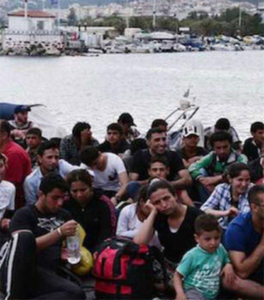Refugees in camps at risk of health catastrophe
As the COVID-19 pandemic spreads globally migrants and refugees in camps around the globe could become the epicentre of the tragedy.
Aid agencies and local authorities from the US-Mexico border to the camps on Greek islands are worried that large outbreaks will collapse health systems.
 Migrants in a sprawling camps along the US border with Mexico have begun to isolate as best they can in their closely packed tents in preparation for the arrival of the coronavirus.
Migrants in a sprawling camps along the US border with Mexico have begun to isolate as best they can in their closely packed tents in preparation for the arrival of the coronavirus.
Migrant and refugee populations around the world – often lacking in state provided healthcare and the ability to isolate themselves at home – are among the most vulnerable to the spread of coronavirus.
According to the UNHCR, there are more than 42,000 refugees and asylum-seekers – two-thirds of whom are women and children – living on the Greek islands of Lesbos, Samos, Chios, Kos, and Leros in dire circumstances of poor health care and overcrowding.
The COVID-19 pandemic could quickly turn these conditions could quickly become deadly. At a time when governments across the world are calling for social distancing and self-isolation, some refugees in Greece are living 15 to 20 people per 45 square metres.
In lines to get food, people are too close to each other to prevent the spread of infection, the agencies say.
In some cases residents are forced to choose between lining up and risking infection or going without food.
Last July, the new Greek government stopped issuing all newcomers with the social security numbers that had allowed them access to free-of-charge public health care.
In February, the reversed this decision but provision of services has not begun.
The UN High Commissioner for Refugees Filippo Grandi has urged countries not to “close avenues to asylum” as part of measures to contain the spread of the coronavirus.
He is worried that some countries could completely block the right to seek asylum.
“With the world mobilizing to combat the spread of Covid-19, many countries are rightly adopting exceptional measures, limiting air travel and cross-border movements,” Mr Grandi said.
“All states must manage their borders in the context of this unique crisis as they see fit. But these measures should not result in closure of avenues to asylum, or of forcing people to return to situations of danger,” he said.
“For many people around the world, everyday life has come to a standstill, or is being transformed in ways that we had never envisaged,” Mr Grandi said.
“But wars and persecution have not stopped – and today, across the globe, people are continuing to flee their homes in search of safety. I am increasingly worried by measures adopted by some countries that could block altogether the right to seek asylum.”
”If health risks are identified, screening arrangements can be put in place, together with testing, quarantine and other measures.
“These will enable authorities to manage the arrival of asylum seekers and refugees in a safe manner, while respecting international refugee protection standards designed to save lives.”
“In these challenging times, let us not forget those who are fleeing war and persecution. They need – we all need – solidarity and compassion now more than ever before,” Mr Grandi said.












